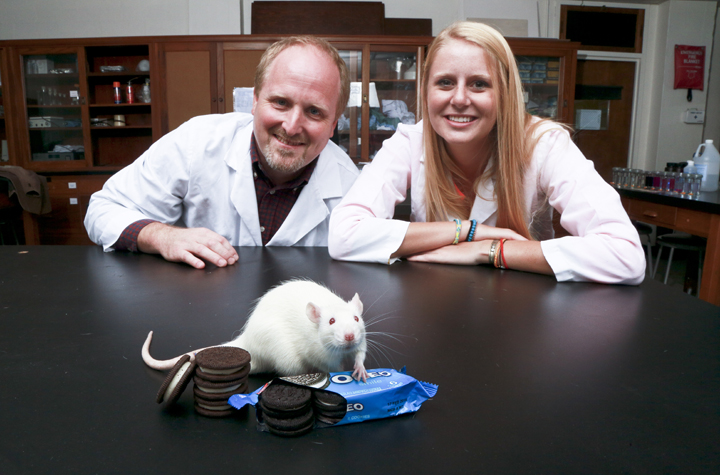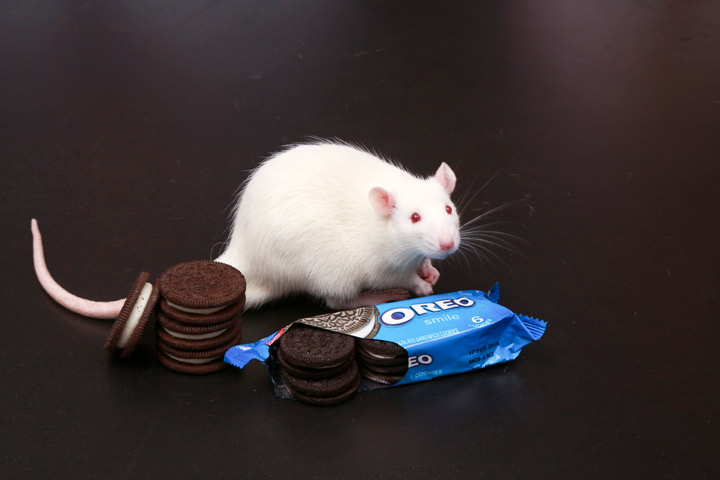TORONTO – Lab rats may have the same appetite and eating habits as the average hungry consumer. In a new study, U.S. researchers say that the rodents prefer Oreos over rice cakes.

And how do the lab rats eat the iconic cookie? They break it open and eat the middle first. It’s yet another study that suggests sugary treats – in this case Oreos – are as addictive as cocaine.
At Connecticut College, Dr. Joseph Schroeder and his students tested a group of rats in two different tests. Within a maze, the rats were fed either Oreos or rice cakes. Other rats were also given an injection of cocaine or morphine or a saline solution as a control.
Read more: How much sugar is in Nutella? Canadian doctor decodes what’s in the hazelnut spread
Turns out, the mice that were conditioned to the Oreos preferred to wait on the “drug” side of the maze as rats that were hooked on cocaine and morphine.
As for the rice cakes? “Just like humans, rats don’t seem to get much pleasure out of eating them,” Schroeder said.
“Our research supports the theory that high-fat/high-sugar foods stimulate the brain in the same way that drugs do,” Schroeder said in a statement.
“It may explain why some people can’t resist these foods despite the fact that they know they are bad for them.”
Read more: 5 tips for packing healthy, kid-friendly back to school lunches
- Posters promoting ‘Steal From Loblaws Day’ are circulating. How did we get here?
- Canadian food banks are on the brink: ‘This is not a sustainable situation’
- Video shows Ontario police sharing Trudeau’s location with protester, investigation launched
- Solar eclipse eye damage: More than 160 cases reported in Ontario, Quebec
Eating Oreos even activated more neurons in the brain’s “pleasure centre” than the addictive drugs, Schroeder’s team found.
Following the study, Schroeder staved off Oreos. “I haven’t touched an Oreo since doing this experiment,” he told Today.com.
Earlier this year, Canadian researchers did their own research with Oreos and mice. In that case, University of Guelph scientists suggested that addiction to sugar is real after they found that mice would go for Oreos even after they had a full dinner.
Read more: Sweeteners create cocaine-like addictions: Canadian study
“There appear to be several biological and psychological similarities between food addiction and drug dependence including craving and loss of control,” another study said.
(Supplied photo from Connecticut College)
The Connecticut research suggests that high fat, sugar-laden foods are more dangerous than drugs because they’re cheaper and easier to access.
Schroeder will present his findings next month at the Society for Neuroscience conference.
A spokesperson for Mondelez International, which owns Nasbico, says the company hasn’t heard from the researcher and has not yet seen the study. (Schroeder will present his findings next month at the Society for Neuroscience conference.)
“While it may seem simple to bucket foods as ‘good’ or ‘bad,’ the reality is that foods are complex, and encouraging people to enjoy a balanced diet paired with physical activity is most important,” the company told Global News in a statement.
“We would caution against interpreting any results as specific to Oreo cookies, since they appear to be used in this research as a proxy for a non-specific ‘sweet’ variable.”
carmen.chai@globalnews.ca
Follow @Carmen_Chai



Comments